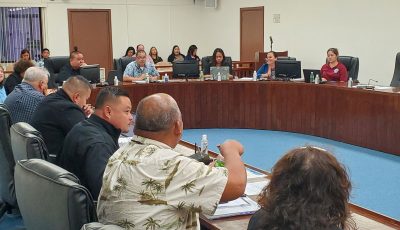‘Co-op education provides opportunities for career-bound students’
The Public School System recognizes that high school students have different paths they want to pursue. One is a college path that prepares the students for college to earn a degree; and second is a career path that prepares students for a job after high school, according to acting Education commissioner Yvonne “Boni” Pangelinan.
“This is really where the nation is going and this is where we also see the importance of providing support to all children not just our students… and so that really launched the beginning of curriculum reconstruction to take a look at the career and technical education courses that PSS provides the students,” she said during the Saipan Chamber of Commerce general membership meeting last Wednesday at Kanoa Resort.
“There are several Career Technical Education courses right now in all of our middle schools and our high schools—from business courses to Science Technology Engineering and Mathematics, video production, visual media entrepreneurship, the arts and hospitality tourism but the primary vehicle for our students for employment and job experience were the rubber meets the road is Cooperative Education,” she added
Cooperative Education was established in 2014 and has been an annual event for PSS high school students.
“PSS and provides all the job training for students who get hired right away and moved into their careers after high school. For some, it is an opportunity to see what they would want to or pursue for their lives and careers,” Pangelinan said.
“We are very proud of these students and of this program,” she added
According to co-op program coordinator Brandon S. Nicolas, with cooperative education, there are so much opportunities for growth.
“We are basically helping our students understand and explore the different career opportunities available to them and we want them to have that pre-determined exposure so they can determine for themselves if I want to go to secondary studies do I want to get into business or marine biology and so forth and it’s been really helpful so far,” he said.
“It’s an elective class that begins in the classroom because co-op education is a class that you can come and enroll in any of our school campuses and learn different things like job placement techniques, career exploration, and prepare for the workforce. It is considered a one-two punch because once you’re done with co-op education, you jump into on the job co-op education training,” he added.
Nicolas said that on the job co-op training is the true highlight of the program.
‘This is where our students put into action everything that they learned… The duration is only a semester long—from August to December… Basically students have to complete 60 hours of on-the-job training every month and 180 hours per semester,” he said.
“I always ask the students this and it’s always the main reason why they get into co-op, they get paid about $900 at the end of the semester so the students pretty much earn and learn… this helps them identify the different benefits that the co-op offers,” he added
Nicolas said that the co-op program starts with a job fair where all the students and company partners come together.
“This is really a fun event and I’m sure all of our partners agree that this is where you meet some interesting characters. This job fair also gives the students a chance at landing interviews with private companies that will hopefully lead to a job offer,” he said
“There is a lot of documentation involved as a lot of our students do off-campus training so there is a lot of liability (issues), but these are all documents that we should go over with participating companies and teachers so we all understand each of our roles and responsibilities,” he added
About every semester, Nicolas said that they conduct a company appreciation event.
“We get together and appreciate all of the accomplishments achieved. It is a great way to cap off a long semester of hard work and partnership and I hope to continue this program with the partners,” he said.
“Last year we had 81 different companies and agencies who participated in the program—55 private companies and 26 in the public sector… we want to thank all our partners for all the good work that you do. A lot of you here today are our community partners and our program ceased to exist without your support and the many opportunities that you open up for our students,” he added.



























